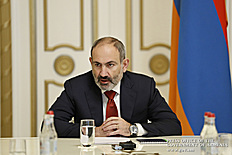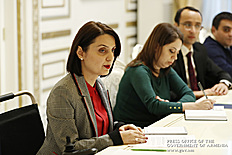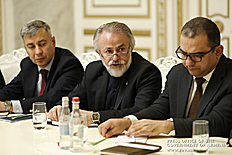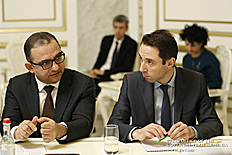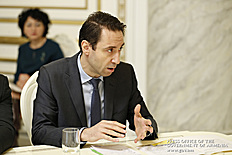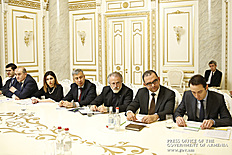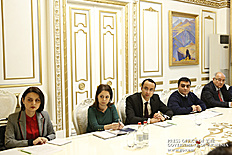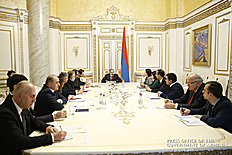Press releases
Nikol Pashinyan: “The government has the task of providing conditions for the disabled to reveal and develop their talent”
more 5 photos
Prime Minister Nikol Pashinyan held a consultative meeting to discuss the problems of disabled persons and identify the ways of dealing with them.
Addressing the meeting, the Prime Minister noted that December 3 is the International Day of Persons with Disabilities, as proclaimed by the UN, which has been celebrated since 1992. “This year’s motto is: “Ensuring active participation of persons with disabilities in social life - the implementation of the 2030 Agenda for Sustainable Development.” There are 189,485 disabled people registered in the Republic of Armenia, of which more than 8 000 are children. And I want to formulate our political approach to citizens suffering from disabilities. We should change the social attitude to disabled persons, namely the feeling of compassion, which is the wrong formula.
There is not only a political problem here, but also a problem of dignity and opportunities. As the Prime Minister of the Republic of Armenia, I feel that we should treat people with disabilities not as a burden, but as a great potential and opportunity.
In general, I imagine the image of Stephen Hawking who, in fact, not even having the ability to move, speak and communicate is deemed to be one of the greatest scientists of the 20th and 21st centuries. I am convinced that there are many talented scientists, writers, artists, businessmen and many other talented people among disabled people in the Republic of Armenia. Therefore, our political task is to provide conditions for these people to reveal and develop their talent. Our activities and policies in this regard should be aimed at achieving these goals. Here I would like to note that when I talk about the disabled, I also mean myself as I have gone through this path of change.
I remember our first meeting with today’s Minister of Labor and Social Affairs Zaruhi Batoyan. At that time I was an MP, and by coincidence it turned out that I had to deal with different issues relating to people with disabilities. Then Ms. Batoyan was one of the most active representatives of civil society dealing with these issues and, for example, there were statements in which many people asked for financial support, increased disability benefits, and I made an appointment to discuss these topics.
During our conversation Mrs. Batoyan said a something very important: “After all, will anything change for the better in disabled people’ life, should the state increase the amount of allowance say by 3000, 5000 or 10000 drams? And we came to the conclusion that nothing will change in the long run, and therefore our task is to provide the disabled the opportunity of developing their skills and talents, let alone the possibility of moving from place to place.
Why did I say that? Thinking that the first part of my speech could be perceived as a lecture, I wanted to say that, like many citizens of the Republic of Armenia, I went through changes in this perception, and it is clear that not only me, but our government has no intention of giving instructions from this rostrum, as a teacher or a lecturer. We are in a continued process of learning, perhaps this is to be our most important feature: we should learn and learn more than we know,” Nikol Pashinyan said.
Then Minister of Labor and Social Affairs Zaruhi Batoyan advised that the process of introducing a new system for assessing disability and providing services is currently underway. The new model and the draft service package have been submitted for interdepartmental discussion to clarify the area of responsibility. According to the minister, the ongoing work and the steps taken are aimed at supporting the state policy for protecting the rights of people with disabilities with socially-targeted regulations, instead of relying on the medical model, as well as reducing corruption risks in that area. The new bill sets out the basic principles and directions of state policy, which are fully consistent with the international treaties ratified by Armenia.
The bill will prohibit discrimination on the basis of disability. If adopted, State and local government authorities and organizations, regardless of their organizational and legal form, will be obliged to ensure that disabled persons have access to the physical environment, information and means of communication, including by creating conditions for them to have unimpeded access to residential, public, industrial and other functional buildings and facilities and to use the transport system and recreational and leisure facilities.
The bill will prohibit the creation for people with disabilities of such residential institutions in which they will be deprived of the right to make decisions about their daily lives; the institution of a personal assistant will be introduced.
Then an exchange of views took place, during which it was noted that in Armenia there are many buildings and structures that are not adapted for people with disabilities and inaccessible to them. Minister Batoyan noted that according to a decision passed in 2007, every new building in Armenia should have the necessary conditions for people with disabilities, but despite its existence, in many cases this requirement has not been met.
The Prime Minister instructed those responsible to carry out an inventory for investigating such cases in order to determine the circle of officials who have accepted these buildings, and to give appropriate legal assessments. At the same time, Nikol Pashinyan instructed to rule out such cases in the future and ensure that all new buildings have accessible conditions for people with disabilities.
Summing up the meeting, the Prime Minister pointed out: “One of the most important aspects of the problem of disability is the country’s development strategy. No country can make a breakthrough unless its development potential is tapped in full. That is why we pay special attention to the involvement of women and people with disabilities in various programs. We say our life is not improving, our economy is not developing. How can it develop, if more than half the country’s economic resource is “locked in houses? This is a very big problem. Why are they so locked up? No matter the reason: be it the tradition, or some other considerations. But there is no way that half or even more than half of the country’s economic resources are de facto or de jure locked up, and we said that the economy is not developing, why we are not becoming a strong state, where we have so many jeeps with good numbers, but the country is not developing.
In this regard, I am glad that a jewelry factory was inaugurated yesterday, and there was a special workshop where people with disabilities could work. This is very important, but a person should be able to go to work every day and so on. And here we are talking not only about them, in terms of economic activity. This also applies to their relatives, because if a person has problems with accessibility, then the activity of his relative is also limited, because the relative must help him, constantly meet his different needs.
In general, when I say that the main perception is compassion, and that I think it is wrong, this does not mean that there are no people for whom our perception can be that way, because there are people who are incapacitated and have mental limitations. Of course, our policy towards these people should be based on a completely different logic,” the Prime Minister said.
According to Nikol Pashinyan, the fact that they say that increasing disability benefits by 5-10 thousand drams will not lead to strategic changes in their lives does not mean that the government does not set itself the task to have at least such a small component improve the lives of citizens.
“I would like to stress that we made some changes in 2019. Benefits have been raised for about 60,000 people; the rise in the amount of pensions will also have an impact, and the decision to increase the minimum pension last year also had some effect. We should abide by the same strategy in overcoming poverty. If, in the case of poverty reduction, we say that poverty can only be overcome through labor, then at least in the case of active disabled people, it is possible to overcome disability through labor. In either case, the state and the government should create real conditions for these people to get a job, generate jobs, and this is our vision,” the Prime Minister concluded.
